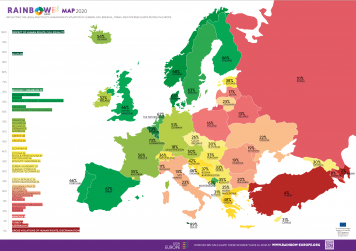Eleventh ILGA-Europe Rainbow Map revealed that in almost half of the European states, including Lithuania, there was no positive change in the field of LGBTI Human rights compared to the 2019 results.
Evelyne Paradis, Executive Director of ILGA Europe, stated: “Amidst the public health emergency and economic turmoil we are facing, there is a crisis of structural inequality unfolding as well, one that makes the many vulnerable people in our societies even more at risk. In the current climate, it is only more evident that laws and policies are often the last lines of defence for LGBTI communities as other marginalised groups. That’s why it’s never been more important that governments enshrine the protection of LGBTI people into law and take concrete measures to make sure that they can live as who they are in societies that are just, equal and fair.”
For the fifth year in a row, Malta continues to take the number one spot on the Rainbow Europe Map, with a score of 89%, followed by Belgium, Luxembourg, Denmark and Norway. The gap between European Union‘s LGBTI equality outsider Poland (16%, placed 42nd) and Lithuania (placed 34rd) is mere 5 % – Lithuania‘s LGBTI human rights index of 23 % remained exactly the same as in 2019.
„2019 has brought some encouraging developments for the Lithuanian LGBTI community: the Constitutional Court expanded its doctrine on discrimination by mentioning not only sexual orientation but also gender identity as a protected ground. It also implied that family relations are not necessarily derived from the union between a man and a woman. “Baltic Pride” march for equality has made history with a record number of participants. However, here we are today in 2020, witnessing stagnation of LGBTI human rights,” commented Vladimir Simonko, Excecutive Director of the National LGBT rights organization LGL.
„With a lack of political will, LGBTI families continue to live in a legal void, transgender individuals have limited access to health services, there is no option of legal gender recognition through administrative measures while continuous neglect of LGBTI questions in educational policy makes a considerable portion of our society resort to stereotypical rhetoric rather than science based knowledge,” Vladimir Simonko continued.
Certain negative changes are evident even among some of LGBTI equality leaders – equality action plans have expired in Belgium, Finland, and France. In the pan-European context, international community is concerned about situation in Hungary with decreased Rainbow Index by 8.46 % as well as Poland and Turkey, considering their alarming policies targeting LGBTI communities prior to the pandemic.




